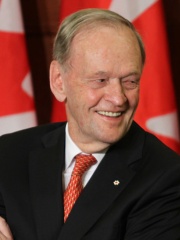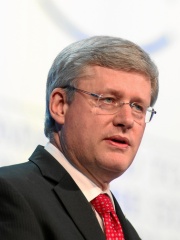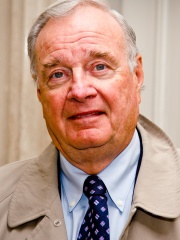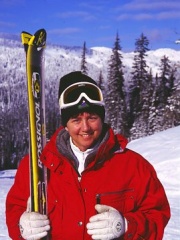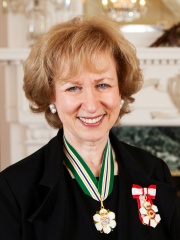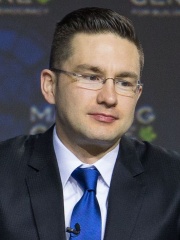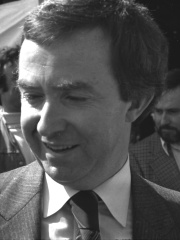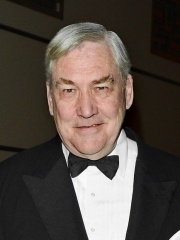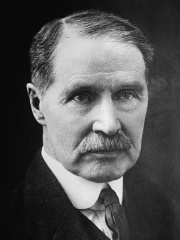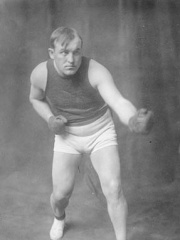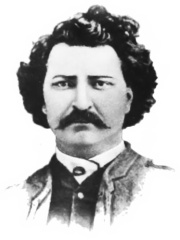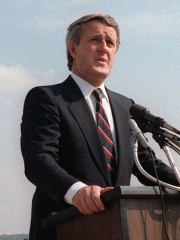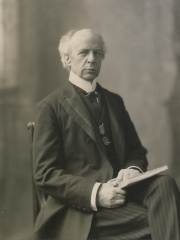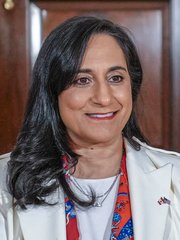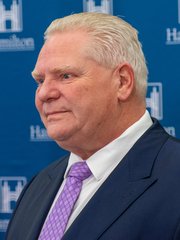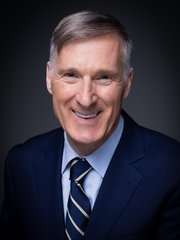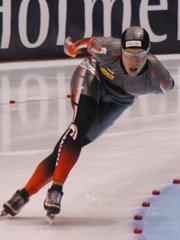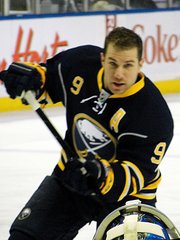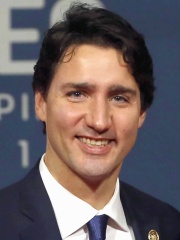
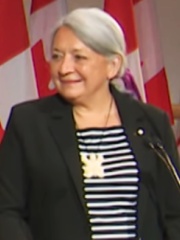

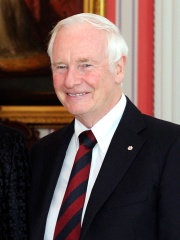
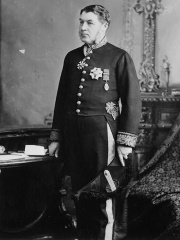
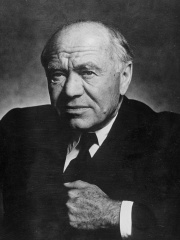
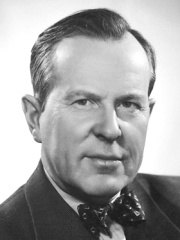
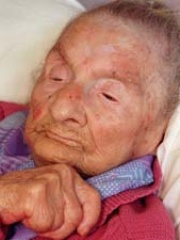
The Most Famous
POLITICIANS from Canada
This page contains a list of the greatest Canadian Politicians. The pantheon dataset contains 19,576 Politicians, 106 of which were born in Canada. This makes Canada the birth place of the 37th most number of Politicians behind Mexico, and Brazil.
Top 10
The following people are considered by Pantheon to be the top 10 most legendary Canadian Politicians of all time. This list of famous Canadian Politicians is sorted by HPI (Historical Popularity Index), a metric that aggregates information on a biography's online popularity. Visit the rankings page to view the entire list of Canadian Politicians.

1. Justin Trudeau (b. 1971)
With an HPI of 78.86, Justin Trudeau is the most famous Canadian Politician. His biography has been translated into 120 different languages on wikipedia.
Justin Pierre James Trudeau (born December 25, 1971) is a Canadian politician who served as the 23rd prime minister of Canada from 2015 to 2025. He led the Liberal Party from 2013 until his resignation in 2025 and was the member of Parliament (MP) for Papineau from 2008 until 2025. Trudeau was born in Ottawa, Ontario, during the first premiership of his father, Pierre Trudeau. He attended Collège Jean-de-Brébeuf and holds a Bachelor of Arts degree in English from McGill University and a Bachelor of Education degree from the University of British Columbia. He then taught at the secondary school level in Vancouver before returning to Montreal in 2002 to further his studies. He served as chair for the youth charity Katimavik and as director of the not-for-profit Canadian Avalanche Association. In 2006, he was appointed as chair of the Liberal Party's Task Force on Youth Renewal. Trudeau was elected to represent the riding of Papineau in the House of Commons in the 2008 federal election. He became the Liberal Party's Official Opposition critic for youth and multiculturalism in 2009 and critic for citizenship and immigration in 2010. In 2011, he was appointed as a critic for secondary education and sport. In 2013, Trudeau was elected as the leader of the Liberal Party. He led the party to a majority government in the 2015 federal election, bringing the party from a third place finish in the previous election with the largest numerical increase of seats by a party in a Canadian election. He became the second-youngest prime minister in Canadian history and the first to be the child of a previous prime minister. Upon assuming office, Trudeau introduced the Canada Child Benefit, legalized medical assistance in dying, legalized recreational cannabis, pursued Senate reform by creating the Independent Advisory Board for Senate Appointments, and established the federal carbon tax. In foreign policy, Trudeau's government resettled refugees of the Syrian civil war, signed the Paris Agreement on climate change, and negotiated trade deals such as the Canada-United States-Mexico Agreement (CUSMA) and the Comprehensive and Progressive Agreement for Trans-Pacific Partnership (CPTPP). He was found twice to have violated conflict of interest law by Canada's ethics commissioner—first in the Aga Khan affair, and later in the SNC-Lavalin affair. Trudeau's Liberal Party was re-elected with a minority government in the 2019 federal election. From 2020, Trudeau responded to the COVID-19 pandemic and subsequent recession by launching financial aid programs, a nationwide vaccination campaign, and military support. His government also announced a ban on "assault-style" weapons after the 2020 Nova Scotia attacks and introduced a national $10-a-day child care program. He was investigated for a third time by the ethics commissioner for his role in the WE Charity scandal, but was cleared of wrongdoing. Trudeau led the Liberals to another minority government in the 2021 federal election. He then invoked the Emergencies Act for the first time in Canadian history in response to the Freedom Convoy protests; the Federal Court later ruled this action unjustified and in violation of Charter rights. His party signed a confidence and supply agreement with the New Democratic Party (NDP) in early 2022, which resulted in the enactment of the Canadian Dental Care Plan and a framework for national pharmacare before the NDP's withdrawal from the agreement in late 2024. On the international stage, Trudeau's government responded to the Russian invasion of Ukraine by imposing sanctions on Russia and authorizing humanitarian and military aid to Ukraine. His premiership ended during a trade war with the United States, to which he responded by enacting 25% retaliatory tariffs on $30 billion of U.S. goods. Following a steady decline in popular support, the sudden resignation of deputy prime minister Chrystia Freeland in December 2024 and an ensuing political crisis, Trudeau announced in January 2025 that he would resign as prime minister and leader of the Liberal Party. He advised the Governor General to prorogue Parliament until March 24, while the party held a leadership election. Trudeau remained Liberal leader until Mark Carney was elected as his successor on March 9. He resigned as prime minister five days later and stood down as an MP at the 2025 federal election.

2. Mary Simon (b. 1947)
With an HPI of 76.61, Mary Simon is the 2nd most famous Canadian Politician. Her biography has been translated into 35 different languages.
Mary Jeannie May Simon (born August 21, 1947) is a Canadian civil servant, diplomat, and former broadcaster who has been serving as the 30th governor general of Canada since July 26, 2021. She is Inuk on her mother's side, making her the first Indigenous person to hold the office. Simon was born in Fort Severight (now Kangiqsualujjuaq), Quebec. She briefly worked as a producer and announcer for the CBC Northern Service in the 1970s before entering public service, serving on the board of the Northern Quebec Inuit Association and playing a key role in the Charlottetown Accord negotiations. She was Canada's first ambassador for circumpolar affairs from 1994 to 2004, as well as a lead negotiator for the creation of the Arctic Council. She also served as the Canadian ambassador to Denmark from 1999 to 2002. On July 6, 2021, Prime Minister Justin Trudeau announced that Queen Elizabeth II had approved Simon's appointment as governor general. Her appointment was criticized, as she is not fluent in French, an official language of Canada.

3. Pierre Trudeau (1919 - 2000)
With an HPI of 71.96, Pierre Trudeau is the 3rd most famous Canadian Politician. His biography has been translated into 82 different languages.
Joseph Philippe Pierre Yves Elliott Trudeau (October 18, 1919 – September 28, 2000) was a Canadian politician and lawyer who served as the 15th prime minister of Canada from 1968 to 1979 and again from 1980 to 1984. Between his non-consecutive terms as prime minister, he served as the leader of the Official Opposition from 1979 to 1980. Trudeau was born and raised in Outremont, Quebec, and studied politics and law. In the 1950s, he rose to prominence as a labour activist in Quebec politics by opposing the conservative Union Nationale government. Trudeau was then an associate professor of law at the Université de Montréal. He was originally part of the social democratic New Democratic Party (NDP), but then joined the Liberal Party in 1965, believing that the NDP could not achieve power. That year, he was elected to the House of Commons, and was quickly appointed as prime minister Lester B. Pearson's parliamentary secretary. In 1967, Trudeau was appointed as minister of justice and attorney general, during which time he liberalized divorce and abortion laws and decriminalized homosexuality. Trudeau's outgoing personality and charisma caused a sensation, termed "Trudeaumania", which helped him win the leadership of the Liberal Party in 1968. He then succeeded Pearson and became prime minister of Canada. From the late 1960s until the mid-1980s, Trudeau dominated the Canadian political scene. After his appointment as prime minister, he won the 1968, 1972, and 1974 federal elections, before narrowly losing in 1979. He won a fourth election victory shortly afterwards, in 1980. Trudeau is the most recent prime minister to win four elections (having won three majority governments and one minority government) and to serve non-consecutive terms. His tenure of 15 years and 164 days makes him the third longest-serving prime minister in Canadian history, behind John A. Macdonald and William Lyon Mackenzie King. As prime minister, Trudeau pioneered official bilingualism and multiculturalism. During the Quebec sovereignty movement, he invoked the War Measures Act in response to the 1970 October Crisis and successfully led the federalist campaign against the 1980 Quebec sovereignty-association referendum. In economic policy, he introduced the capital gains tax, expanded welfare programs, and oversaw major increases in deficit spending. He also enacted the Anti-Inflation Act in response to the 1970s recession. In a bid to move the Liberal Party towards economic nationalism, Trudeau established Petro-Canada and launched the National Energy Program, both of which generated significant controversy in oil-rich Western Canada and led to a rise in what was called "Western alienation". His government also converted Canada to the metric system, established Via Rail, and enacted the Access to Information Act and the Canada Health Act. Trudeau pursued an independent path in foreign policy. He reduced alignment with the United States, maintained cordial relations with the Soviet Union, and developed strong ties with China and Cuban leader Fidel Castro, which put him at odds with other Western capitalist states. He also oversaw Canada's entry into the G7 forum. In 1982, Trudeau patriated the Constitution of Canada and established the Canadian Charter of Rights and Freedoms, which, with the passage of the Constitution Act, 1982, achieved full Canadian sovereignty. Trudeau retired from politics shortly before the 1984 federal election. In his retirement, Trudeau practised law at the Montreal law firm of Heenan Blaikie. He also spoke out against the Meech Lake and Charlottetown accords (which proposed granting Quebec certain concessions), arguing they would strengthen Quebec nationalism. Trudeau died in 2000. He is ranked highly among scholars in historical rankings of Canadian prime ministers, though he remains a divisive figure in Canadian politics. Critics accused him of arrogance, economic mismanagement, and unduly centralizing Canadian decision-making to the detriment of the culture of Quebec and the economy of the Prairies, while admirers praised what they considered to be the force of his intellect and his political acumen which maintained national unity throughout the Quebec sovereignty movement. Trudeau's eldest son, Justin Trudeau, served as the 23rd prime minister of Canada from 2015 to 2025, becoming the first prime minister of Canada to be the child of a previous prime minister.

4. David Johnston (b. 1941)
With an HPI of 71.40, David Johnston is the 4th most famous Canadian Politician. His biography has been translated into 36 different languages.
David Lloyd Johnston (born June 28, 1941) is a Canadian academic, author, and statesman who served as the 28th governor general of Canada from 2010 to 2017. Johnston was the special rapporteur appointed to investigate reports of foreign interference in recent Canadian federal elections until his resignation on June 9, 2023. Johnston was born and raised in Ontario, studying there before enrolling at Harvard University and later Cambridge and Queen's universities. He went on to work as a professor at various post-secondary institutions in Canada, eventually serving administrative roles as dean of law at the University of Western Ontario, principal of McGill University, and president of the University of Waterloo. At the same time, Johnston involved himself with politics and public service, moderating political debates and chairing commissions in both the federal and provincial spheres, his most renowned position in that field being the chairmanship of the inquiry into the Airbus affair. He was in 2010 appointed as governor general by then monarch Queen Elizabeth II, on the recommendation of then Prime Minister of Canada Stephen Harper, to replace Michaëlle Jean as viceroy and he occupied the post until succeeded by Julie Payette in 2017. Johnston also served as a teacher of law at various Canadian universities, dean of law at University of Western Ontario Law School, on various boards, as commissioner of the Leaders' Debates Commission, and as Colonel of the Regiment for the Royal Canadian Regiment.

5. John Sparrow David Thompson (1845 - 1894)
With an HPI of 69.66, John Sparrow David Thompson is the 5th most famous Canadian Politician. His biography has been translated into 32 different languages.
Sir John Sparrow David Thompson (November 10, 1845 – December 12, 1894) was a Canadian lawyer, judge and politician who served as the fourth prime minister of Canada from 1892 until his death in 1894. He had previously been fifth premier of Nova Scotia for a brief period in 1882. He is the only post-Confederation provincial premier to become prime minister, as of 2025. Thompson was born in Halifax, Nova Scotia. He trained as a lawyer and was called to the bar in 1865. Thompson was elected to the Nova Scotia House of Assembly in 1877 as a representative of the Conservative Party. He became the provincial attorney general the following year, in Simon Holmes's government, and replaced Holmes as premier in 1882. However, he served for only two months before losing the 1882 general election to the Liberal Party. After losing the premiership, he accepted an appointment to the Nova Scotia Supreme Court. In 1885, Thompson entered federal politics at the personal request of Prime Minister John A. Macdonald, becoming Minister of Justice. In that role he was the driving force behind the enactment of the Criminal Code. Thompson became prime minister in 1892, following the retirement of John Abbott. He was the first Roman Catholic to hold the position. On a trip to England in 1894, Thompson unexpectedly suffered a heart attack and died, aged 49. He is only the second Canadian prime minister to have died in office, after John A. Macdonald.

6. Charles Tupper (1821 - 1915)
With an HPI of 69.06, Charles Tupper is the 6th most famous Canadian Politician. His biography has been translated into 32 different languages.
Sir Charles Tupper, 1st Baronet (July 2, 1821 – October 30, 1915), was a Canadian Father of Confederation who served as the sixth prime minister of Canada from May 1 to July 8, 1896. As the premier of Nova Scotia from 1864 to 1867, he led Nova Scotia into Confederation. He briefly served as the Canadian prime minister, from seven days after parliament had been dissolved, until he resigned on July 8, 1896, following his party's loss in the 1896 Canadian federal election. He is the only medical doctor to have ever held the office of prime minister of Canada, and his 69-day tenure as prime minister is the shortest in Canadian history. Tupper was born in Amherst, Nova Scotia, to the Rev. Charles Tupper and Miriam Lockhart. He was educated at Horton Academy, Wolfville, Nova Scotia, and studied medicine at the University of Edinburgh Medical School, graduating MD in 1843. By the age of 22 he had handled 116 obstetric cases. He practiced medicine periodically throughout his political career (and served as the first president of the Canadian Medical Association). He entered Nova Scotian politics in 1855 as a protégé of James William Johnston. During Johnston's tenure as premier of Nova Scotia in 1857–1859 and 1863–1864, Tupper served as provincial secretary. Tupper replaced Johnston as premier in 1864. As premier, he established public education in Nova Scotia and expanded Nova Scotia's railway network in order to promote industry. By 1860, Tupper supported a union of all the colonies of British North America. Believing that immediate union of all the colonies was impossible, in 1864, he proposed a Maritime Union. However, representatives of the Province of Canada asked to be allowed to attend the meeting in Charlottetown scheduled to discuss Maritime Union in order to present a proposal for a wider union, and the Charlottetown Conference thus became the first of the three conferences that secured Canadian Confederation. Tupper also represented Nova Scotia at the other two conferences, the Quebec Conference (1864) and the London Conference of 1866. In Nova Scotia, Tupper organized a Confederation Party to combat the activities of the Anti-Confederation Party organized by Joseph Howe and successfully led Nova Scotia into Confederation. Following the passage of the British North America Act in 1867, Tupper resigned as premier of Nova Scotia and began a career in federal politics. He held multiple cabinet positions under Prime Minister John A. Macdonald, including President of the Queen's Privy Council for Canada (1870–1872), Minister of Inland Revenue (1872–1873), Minister of Customs (1873–1874), Minister of Public Works (1878–1879), and Minister of Railways and Canals (1879–1884). Initially groomed as Macdonald's successor, Tupper had a falling-out with Macdonald, and by the early 1880s, he asked Macdonald to appoint him as Canadian High Commissioner to the United Kingdom. Tupper took up his post in London in 1883, and would remain High Commissioner until 1895, although in 1887–1888, he served as Minister of Finance without relinquishing the High Commissionership. In 1895, the government of Mackenzie Bowell floundered over the Manitoba Schools Question; as a result, several leading members of the Conservative Party of Canada demanded the return of Tupper to serve as prime minister. Tupper accepted this invitation and returned to Canada, becoming prime minister in May 1896. Just before he was sworn in as prime minister, the 1896 federal election was called, in which his party lost to Wilfrid Laurier and the Liberals. Tupper served as leader of the Opposition from July 1896 until he resigned in February 1901, just months after his second defeat at the polls in 1900. He returned to London, England, where he lived until his death in 1915 and was buried back in Halifax, Nova Scotia. He was the last surviving Canadian father of Confederation. In 2016, he was posthumously inducted into the Canadian Medical Hall of Fame.

7. Max Aitken, 1st Baron Beaverbrook (1879 - 1964)
With an HPI of 67.27, Max Aitken, 1st Baron Beaverbrook is the 7th most famous Canadian Politician. His biography has been translated into 28 different languages.
William Maxwell Aitken, 1st Baron Beaverbrook (25 May 1879 – 9 June 1964), was a Canadian-British newspaper publisher and backstage politician who was an influential figure in British media and politics of the first half of the 20th century. His base of power was the largest circulation newspaper in the world, the Daily Express, which appealed to the conservative working class with intensely patriotic news and editorials. During the Second World War, he played a major role in mobilising industrial resources as Winston Churchill's Minister of Aircraft Production. The young Max Aitken had a gift for making money and was a millionaire by the age of 30. His business ambitions quickly exceeded opportunities in Canada, and he moved to Britain. There he befriended Andrew Bonar Law and with his support won a seat in the House of Commons at the December 1910 United Kingdom general election. A knighthood followed shortly after. During the First World War, he ran the Canadian Records office in London, and played a role in the removal of H. H. Asquith as prime minister in 1916. The resulting coalition government (with David Lloyd George as prime minister and Bonar Law as Chancellor of the Exchequer) rewarded Aitken with a peerage and, briefly, a Cabinet post as Minister of Information. After the war, the now Lord Beaverbrook concentrated on his business interests. He built the Daily Express into the most successful mass-circulation newspaper in the world, with sales of 2.25 million copies a day across Britain. He used it to pursue personal campaigns, most notably for tariff reform and for the British Empire to become a free trade bloc. Beaverbrook supported the governments of Stanley Baldwin and Neville Chamberlain throughout the 1930s and was persuaded by another long-standing political friend, Winston Churchill, to serve as his Minister of Aircraft Production from May 1940. Churchill later praised his "vital and vibrant energy". He resigned due to ill-health in 1941 but later in the war was appointed Lord Privy Seal. Beaverbrook spent his later life running his newspapers, which by then included the Evening Standard and the Sunday Express. He served as Chancellor of the University of New Brunswick and developed a reputation as a historian with his books on political and military history.

8. Lester B. Pearson (1897 - 1972)
With an HPI of 65.61, Lester B. Pearson is the 8th most famous Canadian Politician. His biography has been translated into 72 different languages.
Lester Bowles Pearson (23 April 1897 – 27 December 1972) was a Canadian politician, diplomat, and scholar who served as the 14th prime minister of Canada from 1963 to 1968. He also served as leader of the Liberal Party from 1958 to 1968 and as leader of the Official Opposition from 1958 to 1963. Born in Newtonbrook, Ontario (now part of Toronto), Pearson pursued a career in the Department of External Affairs went on to serve as the Canadian ambassador to the United States from 1944 to 1946. He entered politics in 1948 as Secretary of State for External Affairs, serving in that position until 1957 in the governments of William Lyon Mackenzie King and Louis St. Laurent. Pearson was also the seventh president of the United Nations General Assembly from 1952 to 1953. He was a candidate to become secretary-general of the United Nations in 1953, but was vetoed by the Soviet Union. He later won the Nobel Peace Prize in 1957 for organizing the United Nations Emergency Force to resolve the Suez Crisis, for which he received worldwide attention. After the Liberal Party was defeated in the 1957 federal election, Pearson handily won the leadership of the party in 1958. He suffered two consecutive defeats by Progressive Conservative prime minister John Diefenbaker in 1958 and 1962. He successfully challenged Diefenbaker for a third time in the 1963 federal election, winning a minority government. Pearson's Liberals won another minority government in the 1965 federal election. During Pearson's tenure as prime minister, he launched progressive policies including the Canada Student Loan Program, the Canada Pension Plan, the Canada Assistance Plan, the Canada Labour Code, and universal health care. He introduced royal commissions on bilingualism and biculturalism and the status of women, and unified the Canadian Armed Forces. Pearson's government also oversaw the creation of the Maple Leaf flag in 1965 (after a national debate known as the Great Canadian flag debate) and the Canadian Centennial celebrations in 1967. In foreign policy, Pearson signed the Auto Pact with the United States and kept Canada out of the Vietnam War. Under his leadership, Canada became the first country in the world to implement a points-based immigration system. After a half-decade in power, Pearson resigned as prime minister and retired from politics. With his government programs and policies, together with his groundbreaking work at the United Nations and in international diplomacy, which included his role in ending the Suez Crisis, Pearson is among the most influential Canadians of the 20th century and is ranked among the greatest Canadian prime ministers.

9. Marie-Louise Meilleur (1880 - 1998)
With an HPI of 65.51, Marie-Louise Meilleur is the 9th most famous Canadian Politician. Her biography has been translated into 20 different languages.
Marie-Louise Fébronie Meilleur (French pronunciation: [maʁi lwiz febʁɔni mɛjœʁ]; née Chassé; August 29, 1880 – April 16, 1998) was a Canadian supercentenarian. She is the oldest validated Canadian ever and upon the death of longevity world record holder Jeanne Calment, became the world's oldest recognized living person.
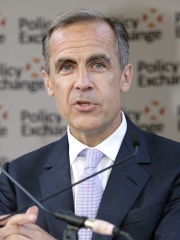
10. Mark Carney (b. 1965)
With an HPI of 64.39, Mark Carney is the 10th most famous Canadian Politician. His biography has been translated into 76 different languages.
Mark Joseph Carney (born March 16, 1965) is a Canadian politician and economist who has been serving as the 24th prime minister of Canada since 2025. He has also been leader of the Liberal Party and the member of Parliament (MP) for Nepean since 2025. He previously was Governor of the Bank of Canada from 2008 to 2013 and Governor of the Bank of England from 2013 to 2020. Carney was born in Fort Smith, Northwest Territories, and raised in Edmonton, Alberta. He graduated with a bachelor's degree in economics from Harvard University in 1987, and earned a master's degree in 1993 and a doctorate in 1995 from the University of Oxford, both in economics. He pursued a career at Goldman Sachs before joining the Bank of Canada as a deputy governor in 2003. In 2004, he joined the Department of Finance Canada as a senior associate deputy minister. From 2008 to 2013, Carney served as the eighth governor of the Bank of Canada, managing Canadian monetary policy during the 2008 global financial crisis. He was appointed as chair of the Financial Stability Board in 2011, serving for two terms until 2018. Following his term as Governor of the Bank of Canada, Carney was appointed as the 120th governor of the Bank of England, serving from 2013 to 2020. The first non-British citizen to be appointed to the role, he led the British central bank's responses to Brexit and the onset of the COVID-19 pandemic. Afterwards, Carney held several roles in both the private and public sectors. He served as chair of Bloomberg L.P., co-chair of the World Bank's private sector investment lab, and vice-chair at Brookfield Asset Management, a subsidiary of Brookfield Corporation. From 2020, Carney was the United Nations Secretary-General's Special Envoy on Climate Action and Finance. Carney was also an informal advisor to Canadian prime minister Justin Trudeau at the start of the COVID-19 pandemic, before returning to the private sector. In 2024, he was appointed as chair of the Liberal Party's Task Force on Economic Growth. In January 2025, after Trudeau announced his resignation amid a political crisis, Carney entered the Liberal Party leadership election, winning a landslide victory that March. After he became party leader, Carney was appointed prime minister, becoming the first prime minister in Canadian history never to have held elected office. Carney then advised the Governor General to dissolve Parliament and trigger a federal election. He led the Liberals to a minority government, overturning earlier poor opinion polling to win the party's fourth consecutive mandate since 2015. He was elected to the House of Commons in the riding of Nepean. During his tenure as prime minister, Carney repealed the federal consumer carbon tax, relaxed environmental regulations, enacted the One Canadian Economy Act to reduce interprovincial trade barriers and expedite major infrastructure projects in response to the ongoing trade war with the United States, and launched the Build Canada Homes agency. Carney's government also announced a sharp increase in defence spending, formally recognized the State of Palestine, and has continued support for Ukraine in the Russo-Ukrainian war. Carney is ideologically characterized as a centrist, technocrat, and a Blue Grit Liberal.
People
Pantheon has 106 people classified as Canadian politicians born between 1814 and 1998. Of these 106, 62 (58.49%) of them are still alive today. The most famous living Canadian politicians include Justin Trudeau, Mary Simon, and David Johnston. The most famous deceased Canadian politicians include Pierre Trudeau, John Sparrow David Thompson, and Charles Tupper. As of April 2024, 15 new Canadian politicians have been added to Pantheon including Anita Anand, Doug Ford, and Maxime Bernier.
Living Canadian Politicians
Go to all RankingsJustin Trudeau
1971 - Present
HPI: 78.86
Mary Simon
1947 - Present
HPI: 76.61
David Johnston
1941 - Present
HPI: 71.40
Mark Carney
1965 - Present
HPI: 64.39
Jean Chrétien
1934 - Present
HPI: 64.20
Stephen Harper
1959 - Present
HPI: 62.97
Paul Martin
1938 - Present
HPI: 62.96
Nancy Greene Raine
1943 - Present
HPI: 62.67
Kim Campbell
1947 - Present
HPI: 60.62
Pierre Poilievre
1979 - Present
HPI: 59.88
Joe Clark
1939 - Present
HPI: 59.66
Conrad Black
1944 - Present
HPI: 59.52
Deceased Canadian Politicians
Go to all RankingsPierre Trudeau
1919 - 2000
HPI: 71.96
John Sparrow David Thompson
1845 - 1894
HPI: 69.66
Charles Tupper
1821 - 1915
HPI: 69.06
Max Aitken, 1st Baron Beaverbrook
1879 - 1964
HPI: 67.27
Lester B. Pearson
1897 - 1972
HPI: 65.61
Marie-Louise Meilleur
1880 - 1998
HPI: 65.51
Bonar Law
1858 - 1923
HPI: 63.68
Tommy Burns
1881 - 1955
HPI: 63.23
Louis Riel
1844 - 1885
HPI: 63.20
William Lyon Mackenzie King
1874 - 1950
HPI: 62.90
Brian Mulroney
1939 - 2024
HPI: 62.06
Wilfrid Laurier
1841 - 1919
HPI: 61.16
Newly Added Canadian Politicians (2025)
Go to all RankingsAnita Anand
HPI: 44.28
Doug Ford
1964 - Present
HPI: 44.26
Maxime Bernier
1963 - Present
HPI: 43.27
David Savard
1990 - Present
HPI: 37.36
Arne Dankers
1980 - Present
HPI: 36.96
Blythe Hartley
1982 - Present
HPI: 36.21
François Hamelin
1986 - Present
HPI: 35.99
Linden Vey
1991 - Present
HPI: 35.53
Katalin Cseh
1988 - Present
HPI: 35.20
Derek Roy
1983 - Present
HPI: 34.55
Matt Dalton
1986 - Present
HPI: 34.45
Karine Sergerie
1985 - Present
HPI: 34.20
Overlapping Lives
Which Politicians were alive at the same time? This visualization shows the lifespans of the 25 most globally memorable Politicians since 1700.

